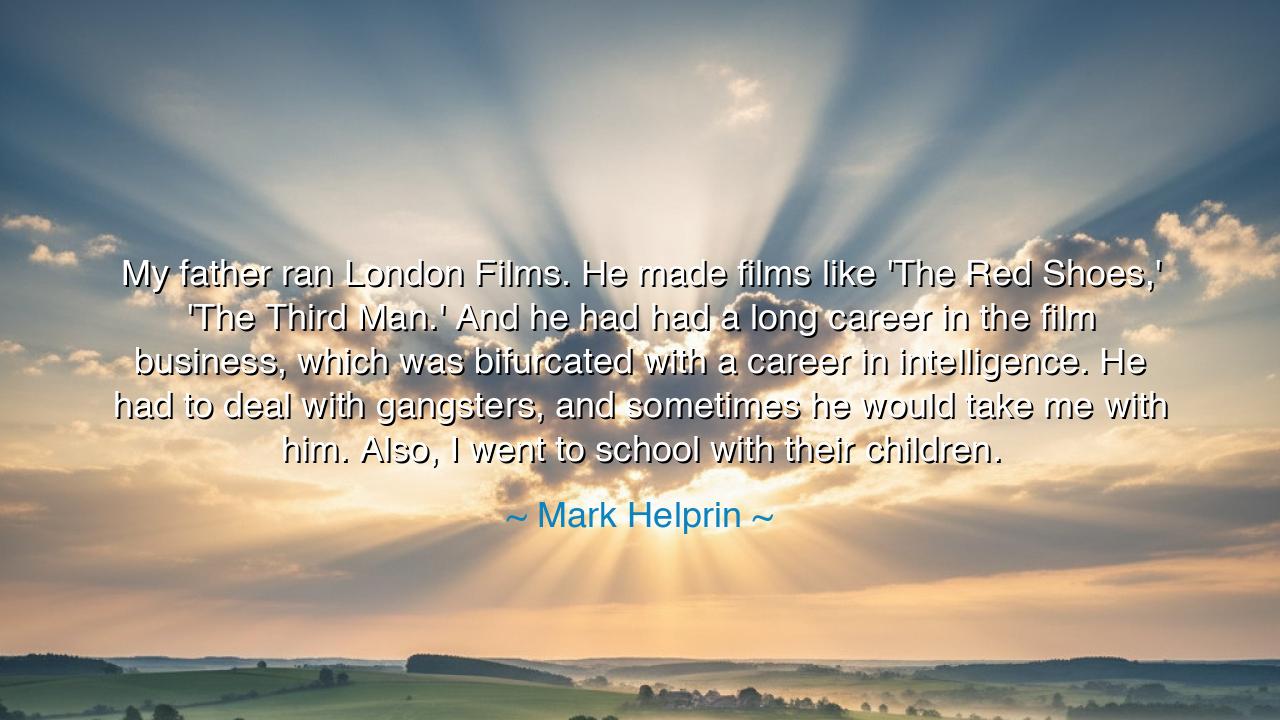
My father ran London Films. He made films like 'The Red Shoes,'
My father ran London Films. He made films like 'The Red Shoes,' 'The Third Man.' And he had had a long career in the film business, which was bifurcated with a career in intelligence. He had to deal with gangsters, and sometimes he would take me with him. Also, I went to school with their children.






Hear now the voice of lineage and memory, and ponder the words of Mark Helprin, who spoke of the strange duality of his inheritance: “My father ran London Films. He made films like ‘The Red Shoes,’ ‘The Third Man.’ And he had had a long career in the film business, which was bifurcated with a career in intelligence. He had to deal with gangsters, and sometimes he would take me with him. Also, I went to school with their children.” This is not merely a recollection of childhood; it is a revelation of how the worlds of beauty and danger, of art and secrecy, can intertwine in the shaping of a soul.
In this reflection, Helprin unveils a truth that the ancients themselves would recognize: that life is rarely pure or singular. The same man who produced films of dazzling artistry — The Red Shoes, a hymn to passion and sacrifice, and The Third Man, a study of moral ambiguity — also walked among shadows, navigating the perilous world of espionage and power. His father’s dual existence — art and intelligence — speaks to the eternal balance between creation and control, between the imagination that gives light and the cunning that survives the dark.
The image of a father who moves between filmmakers and gangsters is striking, even mythic. It recalls the stories of heroes who must cross into dangerous realms to achieve wisdom. In the ancient world, Odysseus was such a figure — a man of intellect and strategy, both poet and deceiver, journeying through treachery to return home transformed. So too, Helprin’s father was a man of paradox: one foot in the dreamscapes of cinema, the other in the cryptic corridors of intelligence. Through him, the young Helprin glimpsed that the world of art is not untouched by shadow, that even beauty is born in proximity to danger.
What makes this confession poignant is not the glamour of film or the intrigue of spies, but the child’s awakening to the complexity of human nature. To go to school with the children of gangsters, to watch one’s father converse with both artists and agents, is to learn early that no world is pure, and no life can be lived within a single frame. This is a lesson that Helprin would later weave into his own works — stories filled with light and shadow, idealism and loss, grandeur and decay. The roots of that vision lie in the dual heritage of art and intelligence, of creation and cunning, that shaped his early years.
Consider also the symbolic power of London Films itself. It was a studio that created movies both magical and moral — The Red Shoes, for example, a fable about obsession, beauty, and sacrifice. That his father could birth such art while also maneuvering through the world of espionage is emblematic of a timeless truth: that those who create must also understand darkness, for only by knowing it can one portray the light. The filmmaker and the spy, in their own ways, both interpret human motives and craft illusions — one for art, the other for survival.
The wisdom here, children of the future, is this: do not fear contradiction within your life. The world will often force you to balance art and duty, heart and intellect, truth and secrecy. Embrace these dualities, for in them lies the fullness of being. To live only in purity is to live in ignorance; to walk through both the beauty of creation and the peril of reality is to live awake.
Therefore, take from Mark Helprin’s memory a sacred teaching: every life is a tapestry of contrasts. What may seem a clash — art and intelligence, innocence and exposure, light and shadow — is, in truth, the harmony of existence. Seek, then, to bring all parts of yourself into unity, as his father did — to see the poetry in the streets and the strategy in the stars. For the soul that dares to live in both worlds will always see more deeply, feel more fully, and create more truly.






AAdministratorAdministrator
Welcome, honored guests. Please leave a comment, we will respond soon